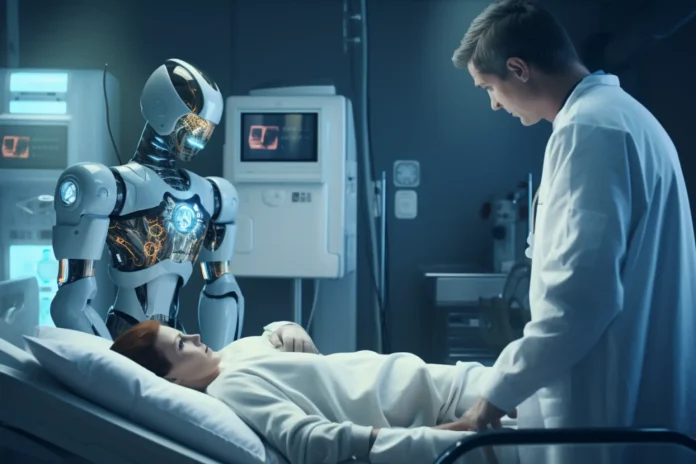The China AI hospital is leading the way in the field of medicine by incorporating AI technology in it. The medical industry is undergoing a significant transformation due to artificial intelligence. This AI Hospital offers new service levels that integrate cutting-edge AI technology with reliable healthcare systems, improving patient experience, accuracy, and efficiency. There appears to be a dramatic change in the medical field after incorporating Artificial Intelligence in it. The new facilities include improving patient experience, making the processes more accurate and efficient. Let me demonstrate some invaluable information and insights to support my findings.
China AI Hospital – All in One Solution
The idea of AI hospitals come into play when there is a need to reduce healthcare disparities, and to enhance the patient’s treatments by using Artificial Intelligence (AI). Thus, what does an actual AI hospital look like? AI hospitals can help in diagnosing illness faster, beforehand planning of treatment, and even can identify the prediction of the outcome of a patient.
An instance of this may be seen in AI Med, a cutting-edge artificial intelligence system created in collaboration with the massive Chinese tech giant Tencent. AI Med uses Machine Learning (ML) techniques to analyse medical data and provide diagnostic aid. I believe that these technologies are quite good at analysing radiological images, which can help doctors find early signs of diseases like lung cancer and other ailments.
However, this is a fact that there is no room for AI technologies to fully replace doctors, in fact, this technology can only simplify the process and can increase the productivity of the processes. Just like, these systems can do work faster than humans do, such as analyzing the data of vast numbers of patients, helping in faster diagnostic times and more efficient and effective treatment plans.
How AI Improves Medical Diagnosis and Therapy
The main aspect of China AI hospital is to improve and enhance diagnostic features by providing accurate and precise, data-driven insights. For this purpose, the system uses complex algorithms and techniques to discover loopholes in medical photographs. Additionally, it makes use of analysing X-rays, MRIs, and CT scans for some major problems including cancers and fractures. Furthermore, extensive study has shown that the application of AI in the medical industry might assist lower the risk of human error. According to a study conducted by Beijing Union Medical College Hospital, AI-assisted radiography equipment contributed to a 20% boost in the accuracy of lung cancer diagnoses. It is really important. Imagine how much comfort it would offer you to know that the diagnosis you have been given is backed by cutting-edge technology that reduces the likelihood of miscommunication.
These AI hospitals can also offer real-time health prediction surveillance. Additionally, these hospitals use wearable technology and the Internet of Things (IoT) to continually monitor the health state of their patients. In the event that any problem is detected—such as an irregular pulse or sudden spike—the system promptly alerts the physicians. The entire system, including the treatment procedure, is being revolutionised by this technology.
Source: Meet ROBO-DOC – The World’s First AI Hospital Unveiled With (Robot Doctors)
AI in Surgery and Other Fields
One area where China AI Hospital particularly shines is in surgical procedures. Several interesting case studies I’ve read demonstrate how significantly shorter patients’ recovery times may be with AI-assisted procedures. Artificially intelligent robots can sometimes help surgeons perform minimally invasive procedures more precisely. AI robots aided in knee replacement surgeries at Peking University’s Third Hospital, in one such instance of AI-assisted orthopaedic surgery. What type of result may one expect? Patients healed easier and faster than they had with previous therapies.
By simulating the process and projecting potential results, artificial intelligence (AI) may be able to help physicians create surgical treatment plans. If I were in that scenario, I would feel much more confident knowing that AI was involved in the planning of the operation.
Privacy and Ethical Issues
Everytime, with the advent of new technology, there always aroused some concerns regarding data and information privacy. And when it comes to AI systems which gather large amounts of data, concerns about security are valid. Addressing these concerns, these AI systems are fully optimized with security procedures in order to safeguard patient’s sensitive data.
AI technology greatly helps in enhancing the decision-making process of doctors. However, these systems cannot replace doctors, especially in the medical field. Understanding the health problem, thinking and planning about the treatment solution, and in-depth knowledge of their patients is something that only human doctors can truly understand. While AI will never be able to fully replace humans, it can help in enhancing decision-making skills to increase the effectiveness of the healthcare system.
China AI hospital is really leading the way by their offerings in the healthcare sector. They are completely transforming the healthcare system by combining medical expertise with intelligent AI technology. These systems are enhancing the reliability, efficiency, and accessibility of the healthcare processes. We can rely on these AI systems that tend to lessen the mistakes made by humans, especially with China’s initiative having a big impact on healthcare systems and is leading the way.



